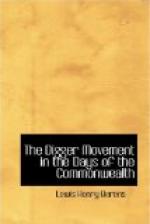conquered ones, and servants and slaves from the time
of the Conquest.
“Further, when a Parliament was chosen in that manner, yet if any Parliament Man, in the uprightness of his heart, did endeavour to promote any freedom contrary to the King’s will or former customs from the Conquest, he was either committed to prison by the King or by the House of Lords, who were his ancient Norman successive Council of War; or else the Parliament was dissolved and broke up by the King. So that the old Laws were made in times under Kingly Slavery, not under the liberty of Commonwealth’s Freedom, because Parliament Men had to have regard to the King’s prerogative interest to uphold his conquest, or else endanger themselves. As sometimes it is in these days, some Officers dare not speak against the minds of those men who are the chief in power, nor a Private Soldier against the mind of his Officer, lest they be cashiered their places and livelihood. And so long as the promoting of the King’s will and prerogative was to be in the eye of the Law Makers, the oppressed Commoners could never enjoy Commonwealth’s Freedom thereby. Yet by the wisdom, courage, faithfulness and industry of some Parliament Men, the Commoners have received here a line and there a line of freedom inserted into their Laws: as those good lines of freedom in Magna Charta were obtained by much hardship and industry.
“Secondly, They were the King’s Laws, because the King’s own creatures made the Laws: Lords of Manors, Freeholders, etc., were successors of the Norman soldiers from the Conquest, therefore they could do no other but maintain their own and the King’s interest. Do we not see that all Laws were made in the days of the King to ease the rich Landlord? The poor laborers were left under bondage still; they were to have no freedom in the earth by those pharisaical Laws. For when Laws were made and Parliaments broke up, the poor oppressed Commoners had no relief; the power of Lords of Manors, withholding the free use of the Common-land from them, remained still. For none durst make any use of any Common-land but at the Lord’s leave, according to the will and law of the Conqueror. Therefore the old Laws were called King’s Laws.”
OF COMMONWEALTH’S LAWS.
“These old Laws cannot govern a Free Commonwealth; because the Land is now to be set free from the slavery of the Norman Conquest, and the power of Lords of Manors and Norman Freeholders is to be taken away. Or else the Commoners are but where they were, if not fallen lower into straits than they were. The Old Laws cannot look with any other face than they did; though they be washed with Commonwealth’s water, their countenance is still withered. Therefore it was not for nothing that the Kings would have all their Laws written in French and Latin, and not in English; partly in honor to the Norman Race, and partly to keep the Common People ignorant




